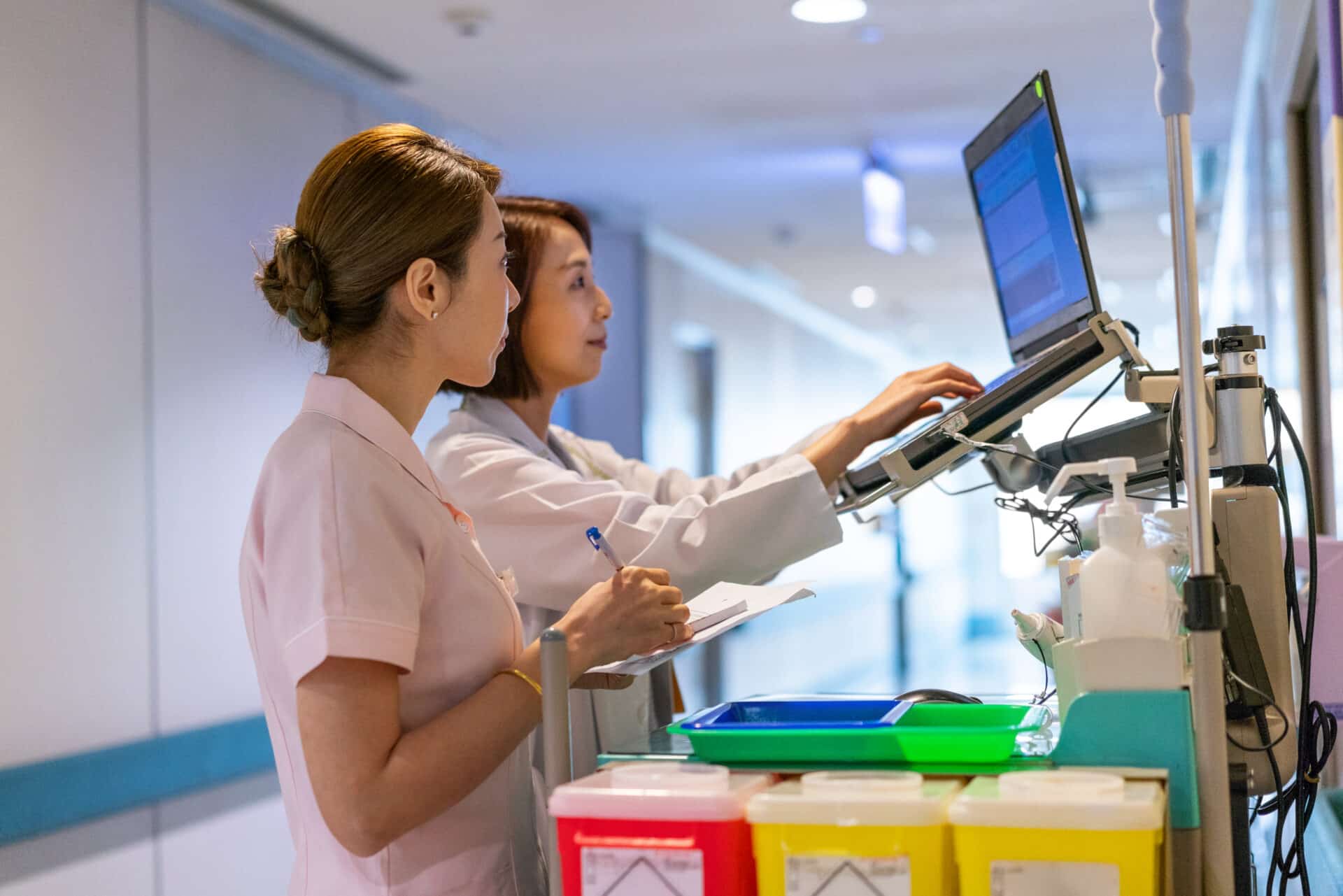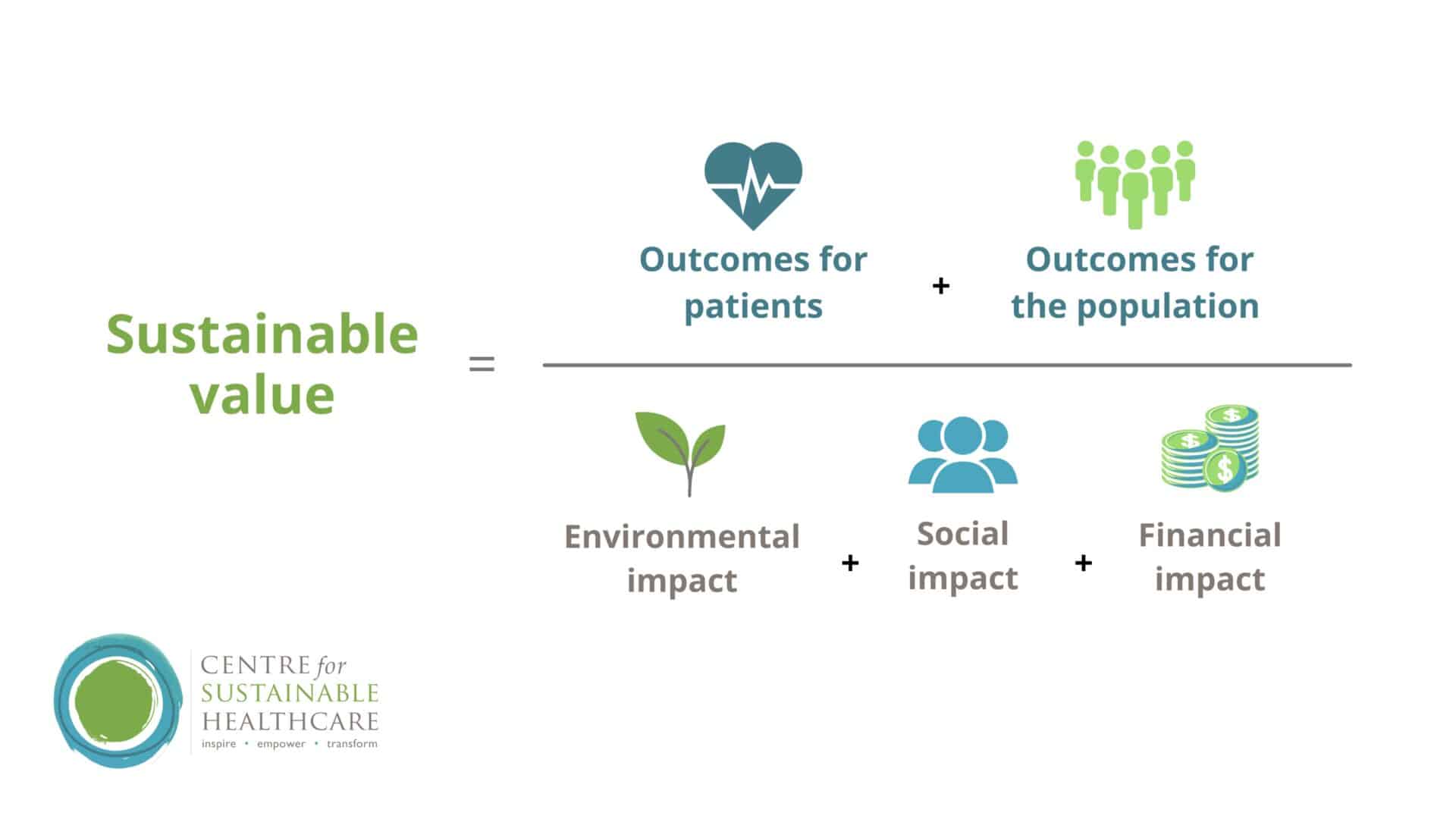
Sustainable Quality Improvement (SusQI)
Today’s healthcare professionals are expected to do more than just deliver excellent patient care; they are also expected to contribute to improving healthcare services, using a process called Quality Improvement (QI). CSH has recognised the importance of embedding sustainable paradigms and initiatives into the foundations of quality improvement if the healtcare sector is to become more sustainable, and our Sustainability in Quality Improvement team is working to that end.
What is Sustainable Quality Improvement (SusQI)?
Sustainability in Quality Improvement (SusQI) is an approach to improving healthcare in a holistic way, by assessing quality and value through the lens of a triple bottom line.
In SusQI, the health outcomes of a service are measured against its environmental, social and economic costs and impacts to determine its sustainable value. SusQI embeds the CSH principles of sustainable clinical practice: prevention, patient empowerment and self-care, lean clinical pathways and low-carbon alternatives.
Rather than being a replacement for traditional QI, SusQI is designed to embed sustainability into current QI theory and practice, and thus provide practical tools to support health-workers in contributing to health-system transformation.
Why is SusQI important?
The framework was developed by the Centre for Sustainable Healthcare with partners, including the Royal College of Physicians, and has been shown to engage and motivate learners to participate in the sustainable healthcare agenda.
The climate and ecological crisis represents the most important threat to human health and wellbeing of the century. The healthcare sector has a significant carbon footprint, and healthcare professionals are increasingly motivated to reduce the harmful environmental and social impact of our health systems. Despite this, there is still a gap in knowledge and skills among healthcare professionals in how to deliver more sustainable healthcare.
By embedding sustainability into quality improvement, social and environmental challenges in healthcare can be addressed as a core part of professional practice, using a recognised method for change.
The SusQI framwork
Sustainability in QI (or SusQI) recognises that there are finite environmental, social and financial resources available to deliver a high standard of patient care. The overall goal of sustainability in quality improvement is to maximise sustainable value. This means to deliver the best possible health outcomes with minimum financial and environmental costs, while adding positive social value at every opportunity. As in standard cost-benefit analysis, the concept can be expressed as an equation, where value = outcomes / costs:

The Sustainability in Quality Improvement framework (SusQI) is an approach to improving healthcare in a holistic way. In SusQI, the “sustainable value” of a service is determined by measuring the health outcomes against its environmental, social and economic costs and impacts (these are sometimes referred to as “the triple bottom line”). By considering outcomes for the whole population as well as for patients, sustainable value can be used to drive improvements to health equity, for example through allocating resources to people with greater health needs or who are not currently receiving care. The framework was developed by CSH with partners, including the Royal College of Physicians.
Benefits of integrating the SusQI framework
SusQI embeds the CSH principles of sustainable clinical practice: prevention, patient empowerment and self-care, lean clinical pathways, and low carbon alternatives.
Including sustainability and resource stewardship in QI allows health professionals to respond to ethical challenges such as climate change and social inequalities. It also benefits the QI process itself: inspiring new energy for change, highlighting wastes and opportunities otherwise overlooked, and directing projects systematically towards the highest value improvements.
SusQI support and learning resources
The Centre for Sustainable Healthcare have designed a range of resources to equip health professionals and educators with the skills to integrate sustainability into quality improvement projects and education.
Free SusQI eLearning session
This free SusQI ‘taster’ session lasts only 30 minutes and provides learners with insight into the value of embedding sustainable healthcare principles into each step of quality improvement
SusQI courses
CSH runs a wide range of courses for health professionals.
Sustainability in Quality Improvement examines in depth how the SusQI framework can be applied in practice to develop preventative, holistic, lean, and low-carbon care. You are invited to draft a plan for implementing SusQI in your workplace, and expert facilitators will provide feedback and suggestions for putting your ideas into action.
Teaching Sustainability in Quality Improvement uses the ‘SusQI’ framework to help health professions educators to integrate sustainability concepts into mainstream quality improvement teaching.
SusQI.org open access resources
The step-by-step guide provides SusQI project resources, including driver diagrams, process maps, a carbon calculation guide and a project development template.
The Educators pack contains materials for teaching SusQI to a variety of learners, such as introductory materials, a slide set, interactive activities, and an assessment guide.
SusQI support for healthcare and education institutions
SusQI Academy
The SusQI Academy provides organisations with support to help them embed sustainability into their QI education and practice by training key staff to become SusQI leads. It is available to those working within health professions education and/or in quality improvement, service transformation and health service delivery.
Course block booking
Achieving sustainable transformation requires widespread staff engagement and training. CSH offers block booking discounts on our SusQI courses and can provide a commissioned course date to train your staff together, facilitating network building across your organisation. This enables your organisation to equip staff with the motivation, skills, and resources necessary to develop low-carbon healthcare projects that align with your Green/Sustainability Plan.
Green Team Competition
The Green Team Competition is an award-winning, tried & tested leadership and engagement programme to transform healthcare by cutting carbon, improving patient care & staff experience and saving money. The Sustainability in Quality Improvement approach is used as a method of change and CSH facilitators work directly with participating teams to develop, run and measure SusQI projects.
SusQI Beacon Site Recognition
Beacon Site Recognition can be applied for by institutions and organisations that integrate or are aspiring to integrate sustainability into quality improvement education and training. This distinction demonstrates their leadership in empowering faculty and/or students to design and implement quality improvement and transformation that embeds sustainability.
Where is SusQI being used?
Our work has spread to sites within six of the eight HEE regions, as well as Wales and Northern Ireland. We are also currently forming new partnerships with sites in Scotland and the Republic of Ireland.
On a national level, SusQI has also been included in the new generalism curriculum developed by HEE, a professional learning and development program which will be undertaken by all trainee doctors across England. The Academy of Medical Royal Colleges has already included sustainability as part of their Quality Improvement curriculum.
Internationally, the sustainable value equation has been integrated into the new Assessment Framework for Quality Standards and Measures of the Netherlands National Care Institute. The SusQI team are also working with the International Society for Quality in Healthcare (ISQua) and the Institute for Healthcare Improvement (IHI) to embed sustainability into international quality improvement standards. It has also been included by the Planetary Health Report Card which is used globally to assess the inclusion of planetary health in healthcare education.
SusQI publications
- Mortimer F, Isherwood J, Wilkinson A, Vaux E. Sustainability in quality improvement: redefining value. Future Healthcare Journal, 2018 Vol.5(2):88-93
- Mortimer F, Isherwood J, Pearce M, Kenward C, Vaux E. Sustainability in quality improvement: measuring impact. Future Healthcare Journal, 2018 Vol.5(2):94-97
- Clery P, d’Arch Smith S, Marsden O, Leedham-Green K. Sustainability in quality improvement (SusQI): a case-study in undergraduate medical education. BMC Med Educ. 2021 Aug 12;21(1):425
- Marsden, O., Clery, P., D’Arch Smith, S. et al. Sustainability in Quality Improvement (SusQI): challenges and strategies for translating undergraduate learning into clinical practice. BMC Med Educ 21, 555 (2021)
- Spooner, R., Stanford, V., Parslow-Williams, S., Mortimer, F., Leedham-Green, K. (2022) “Concrete ways we can make a difference”: A multi-centre, multi-professional evaluation of sustainability in quality improvement education, Medical Teacher
